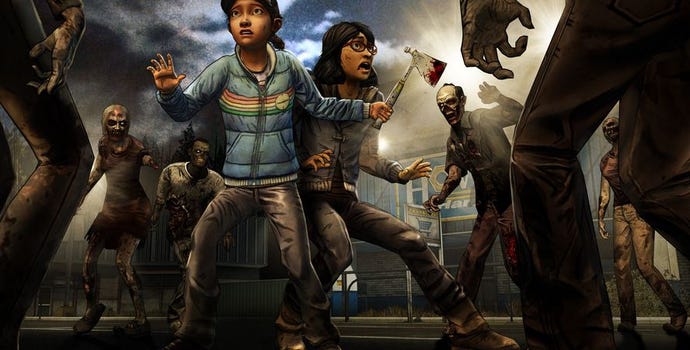The Walking Dead: In Harm's Way review - the bleakest episode yet
The Walking Dead Season 2: Episode 3 - In Harm's Way is the darkest instalment of TellTale's new series, but is it the best? Dave Cook talks about confinement, retribution and new jackets in his review.
I've done my best to avoid SPOILERS, but this is a plot-heavy episode so venture on at your own peril.
Although it's a short episode, In Harm's Way crams enough menace, dread and grim foreshadowing into its running time to leave you mentally exhausted and eager for more by the end. Things are always looking bleak in Kirkman's world, but TellTale's new chapter just upped the depression stakes considerably.
If there's one theme I've picked out of this season so far - I even mentioned this in my review of episode two - it's that there's no such thing as a true safe haven amid the zombie apocalypse. The word 'progress' is just a nicer way of describing a bunch of survivors moving from place to place, leaving nothing but blood and ashes in their wake.
People have a tendency to lie to each other or squabble when there are much bigger things to worry about, and throughout both series we've seen this lead to so much needless death. This is the episode where that dangling penny finally drops, and Clementine starts to realise that the interference of others only leads to trouble. Maybe going it alone is the only way to truly survive?
It's all thanks to Michael Madsen's unnerving villain Carver, who has locked Clementine and her people in the yard of his fortified compound. He's a violent man who is quick to anger and has a zero tolerance stance to people expressing an opinion, acting freely or speaking when not addressed. We see evidence of this early on, when he forces Carlos to beat his own daughter Sarah for talking during a lecture about trust and acceptance.
This is one of many scenes that make for uncomfortable viewing, and although babbling newcomer Reggie, aptly played by Kumail 'Prismo from Adventure Time' Nanjiani. He's the comedic foil to Carver's harsh, totalitarian ways, but something about him always feels 'off,' like he's putting on a brave face because he's both terrified and indoctrinated. I'm still not convinced he lost his arm in a Walker attack either.
Even though Carver beats his own people within an inch of their life, has no issue striking children, and punishes simple slip-ups with death, TellTale's writing is so honed that you actually start to sympathise with the lunatic. He understands what Clementine has secretly been feeling all through this second season; that without rules and order, people cannot be trusted to live in static, everlasting peace. Things will eventually fall apart.
There's a scene in this episode where the pair sit down and address each other in private. The way Carver so expertly finds out everything he needs to know about his captive Clementine by just speaking in a menacing manner and asking the right questions is both powerful and intimidating. He knows that Clem has seen what happens when rules like his aren't enforced and even if you choose to lie and have her agree with his rules, you still get the feeling that deep down she's being genuine.
His compound has food, weapons and security at the cost of everyone essentially giving themselves to slavery. The group fights as usual, Kenny shouts and swears bloody murder and yet, the forlorn look on Clem's face as she looks on suggests a weariness at it all. It's history repeating, and as we all know by now, this kind of conflict never comes to pass without casualties.
While Clem is smart beyond her years - she has to be in such a harsh environment - the same can't be said about Sarah, who has been raised in a sheltered environment as if the apocalypse never happened. She is a weak child without the know-how or initiative to defend herself in a world that demands resilience and a capacity for violence. You will have to coddle and scold her constantly in this episode.
It quickly becomes clear that both girls are polar opposites: Sarah represents the innocence of old-world youth, while Clem stands for the raw fundamentals of survival, thanks in large part to her mentor Lee. You can't blame Sarah for how she was raised, but her foolishness is proper 'scream at your TV' stuff.
There is one moment towards the end of the chapter that I won't spoil for you, but it is hands-down one of the most violent scenes I've witnessed in a game for a long while. It represents the coming of age. The point of no return.
Clem is no longer the young, afraid girl we met in that treehouse long ago.
She's become something formidable.
Disclosure: to assist in writing this review, TellTale Games sent Dave a Steam key for The Walking Dead: Season Two.




